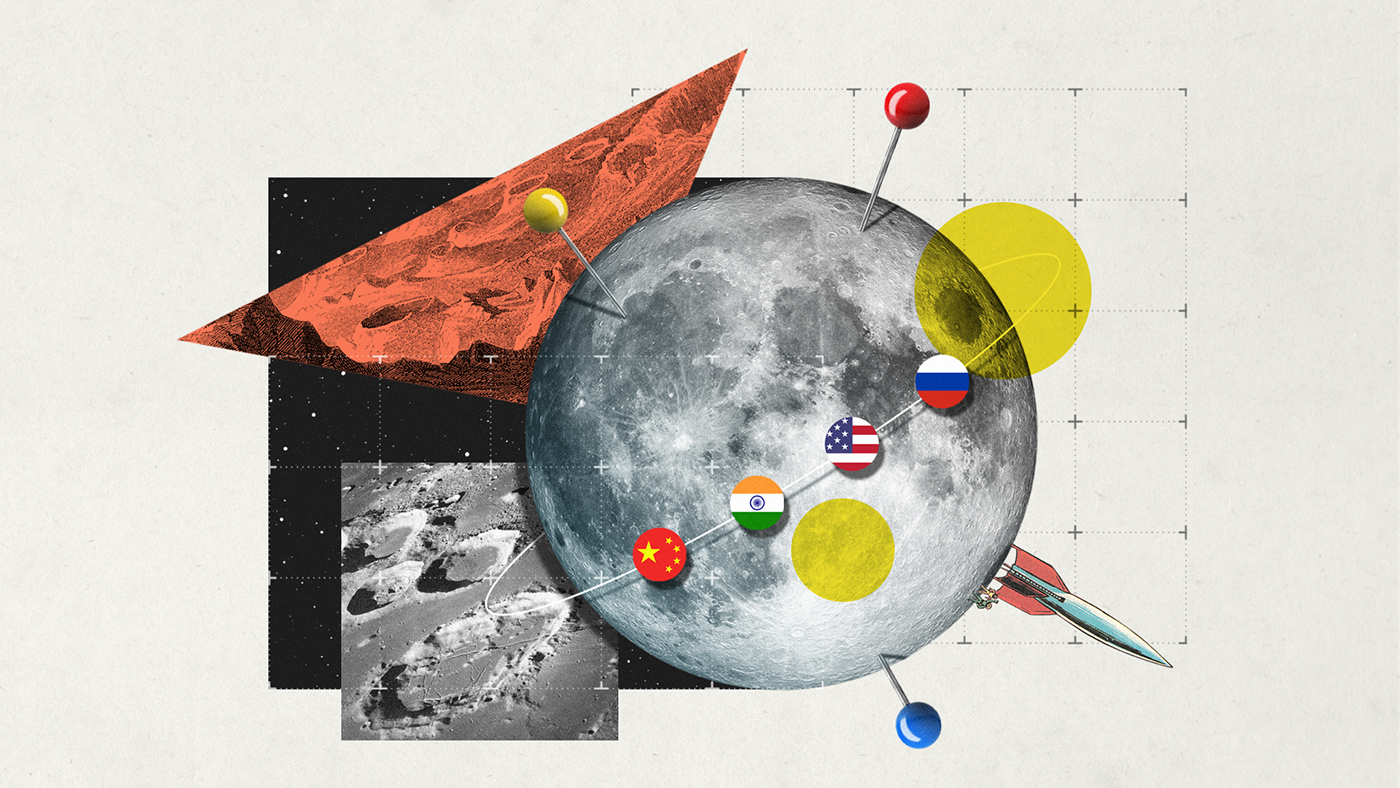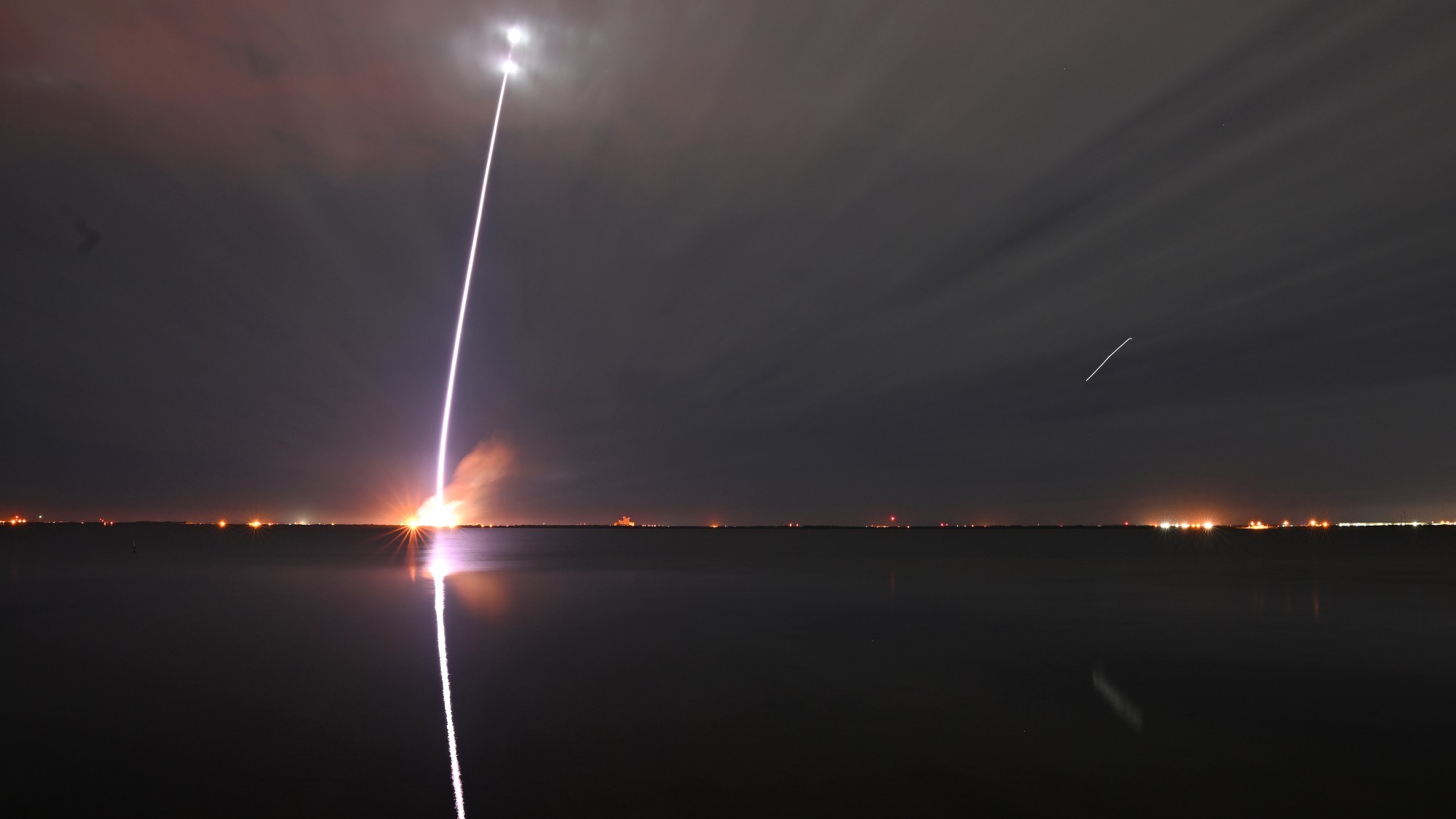Dark side of the Moon: will the race to lunar South Pole spark conflict?
Russia and India are competing for the ‘new lunar gold’ – but real contest will be between the US and China

A free daily email with the biggest news stories of the day – and the best features from TheWeek.com
You are now subscribed
Your newsletter sign-up was successful
Russia and India have kick-started a space race to the Moon’s South Pole in search of water and other precious resources.
The Luna-25 mission, Russia’s first to the Moon since the Soviet Union's Luna-24 in 1976, is due to land at the same time next week as India’s Chandrayaan-3, which launched last month.
Both missions “reflect the renewed interest in the Moon for space exploration”, said the BBC, as Earth enters “a new era of lunar exploration” in which other nations including the US, Israel and China, as well as private companies, are also competing.
The Week
Escape your echo chamber. Get the facts behind the news, plus analysis from multiple perspectives.

Sign up for The Week's Free Newsletters
From our morning news briefing to a weekly Good News Newsletter, get the best of The Week delivered directly to your inbox.
From our morning news briefing to a weekly Good News Newsletter, get the best of The Week delivered directly to your inbox.
What did the papers say?
What is at stake will become “the seventh continent of the Earth, the only one whose riches and resources are yet to be conquered and exploited”, said El País. On the lunar South Pole, “the space powers will compete for the new lunar gold: water”.
In recent years, scientists at Nasa and other international space agencies have detected traces of ice in the region’s shadowed craters. The rough terrain makes landings difficult, however, and India has never successfully landed a spacecraft on the Moon.
This race is a “David and Goliath battle”, the Spanish newspaper added, with India as “the clear underdog”.
But the prize of discovering water ice could be “historic”, said Sky News, “as it may be used for fuel and oxygen, as well as for drinking water”.
A free daily email with the biggest news stories of the day – and the best features from TheWeek.com
Russia also has “much riding” on the Luna-25 mission politically, said France 24. The Kremlin is out to prove its continued capabilities in space, as the country’s aerospace sector is hamstrung by sanctions following the invasion of Ukraine.
The mission will also test Russia’s growing independence in space. Nearly all of Moscow’s space ties with the West are severed, with the exception of the International Space Station, “where the Russian space agency’s cooperation with Nasa is seen as crucial to the outpost’s survival”.
Successfully landing a spacecraft on the rocky lunar South Pole would be a first for any nation, said Politico, and would “prove to Beijing that Moscow still has something to offer when it comes to cutting-edge aerospace technology”. The two countries have already pledged to work together to build a Moon base by the 2030s, but Beijing “is the clear leader these days”, according to the news site.
What next?
Whoever wins the race to the South Pole may grab bagging rites, but the real race will have only just begun.
In contrast to the Russian and Indian missions, which are both unmanned, the US is planning to send astronauts to the lunar South Pole as part of its Artemis programme, which is supported by Canada and European countries.
Artemis II, carrying three Americans and one Canadian, will depart in late 2024 for a flyby of the Moon. Their journey will help Nasa prepare for Artemis III, a crewed mission to the lunar South Pole that will launch no sooner than late 2025.
Experts say that the main rival to the US in this space race is not Russia or India but rather China.
Only the US, China and the Soviet Union have successful landed spacecraft on the Moon, while the likes of India, Japan and Israel have all tried and failed. And with Russia currently facing major hurdles, that leaves the US and China.
Nasa administrator Bill Nelson warned last week that the lunar South Pole might become “another South China Sea”, reported the Hong Kong-based South China Morning Post. Pointing to Beijing’s claims of sovereignty over the disputed sea, Nelson said that “the interest of the international community” also needed to be protected on the Moon.
“If indeed we find water in abundance that could be utilised for future crews and spacecraft, we want to make sure that that’s available to all, not just the one that’s claiming it,” he added.
A question mark hangs over who has the right to claim ownership over part or all of the Moon and its resources.
The Outer Space Treaty, signed in 1967, established that no nation can own the Moon. However, a subsequent treaty known as the Moon Agreement, “which more carefully defines that no nation can own resources on the Moon, has never been signed by key countries including the US, China and Russia”, said the BBC.
-
 6 of the world’s most accessible destinations
6 of the world’s most accessible destinationsThe Week Recommends Experience all of Berlin, Singapore and Sydney
-
 How the FCC’s ‘equal time’ rule works
How the FCC’s ‘equal time’ rule worksIn the Spotlight The law is at the heart of the Colbert-CBS conflict
-
 What is the endgame in the DHS shutdown?
What is the endgame in the DHS shutdown?Today’s Big Question Democrats want to rein in ICE’s immigration crackdown
-
 Are Big Tech firms the new tobacco companies?
Are Big Tech firms the new tobacco companies?Today’s Big Question A trial will determine whether Meta and YouTube designed addictive products
-
 Is Apple’s Tim Cook about to retire?
Is Apple’s Tim Cook about to retire?Today's Big Question A departure could come early next year
-
 Is AI to blame for recent job cuts?
Is AI to blame for recent job cuts?Today’s Big Question Numerous companies have called out AI for being the reason for the culling
-
 How will Ford reinvent EV manufacturing to compete with China?
How will Ford reinvent EV manufacturing to compete with China?Today's Big Question Henry Ford's assembly line system is being replaced
-
 What's Linda Yaccarino's legacy? And what's next for X?
What's Linda Yaccarino's legacy? And what's next for X?Today's Big Question An 'uncertain future' in the age of TikTok
-
 Meta on trial: What will become of Mark Zuckerberg's social media empire?
Meta on trial: What will become of Mark Zuckerberg's social media empire?Today's Big Question Despite the CEO's attempt to ingratiate himself with Trump, Meta is on trial, accused by the U.S. government of breaking antitrust law
-
 How might AI chatbots replace mental health therapists?
How might AI chatbots replace mental health therapists?Today's Big Question Clients form 'strong relationships' with tech
-
 Jeff Bezos, Elon Musk and the billionaire space race
Jeff Bezos, Elon Musk and the billionaire space raceThe Explainer Tesla CEO and Amazon founder vie for dominance of satellite launch market and could influence Nasa plans to return to Moon